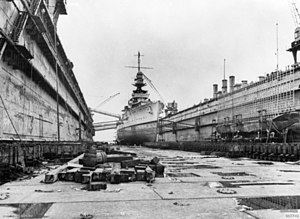Far East Station
| Commander-in-Chief, China | |
|---|---|

A British warship inside the Admiralty IX floating dry dock at Singapore Naval Base in September 1941
|
|
| Active | 1865–1941 |
| Country |
|
| Branch |
|
| Type | Fleet |
| Part of | Admiralty |
| Garrison/HQ |
Singapore Naval Base (1865–1942, 1945–1971) HMS Tamar (1865–1941, 1945–1997) Wei Hai Wei station on Liugong Island (1898–1930) |
The Commander-in-Chief, China was a senior officer position of the British Royal Navy. The officer in this position was in charge of the Navy's vessels and shore establishments in China from 1865 to 1941. He thus directed a naval formation, which was often known, even in official documents, as the China Station.
From 1831 to 1865, the East Indies Station and the China Station were a single command known as the East Indies and China Station. The China Station, established in 1865, had as its area of responsibility the coasts of China and its navigable rivers, the western part of the Pacific Ocean, and the waters around the Dutch East Indies. The navy often co-operated with British commercial interests in this area.
The formation had bases at Singapore (Singapore Naval Base), HMS Tamar (1865–1941 and 1945–1997) in Hong Kong and Wei Hai (1898–1930). The China Station complement usually consisted of several older light cruisers and destroyers, and the Chinese rivers were patrolled by a flotilla of suitable, shallow-draught gunboats, referred to as "China gunboats". Ships on this station usually had a distinctive livery of white hull and superstructure and dark funnels. In response to increased Japanese threats, the separate China Station was merged with the East Indies Station in December 1941 to form the Eastern Fleet.
...
Wikipedia
